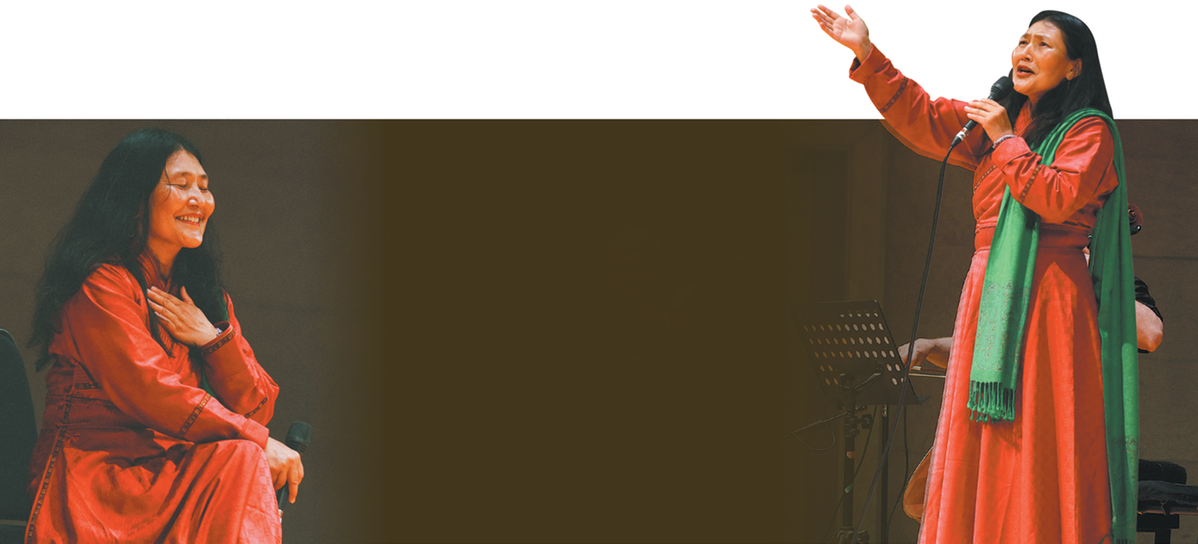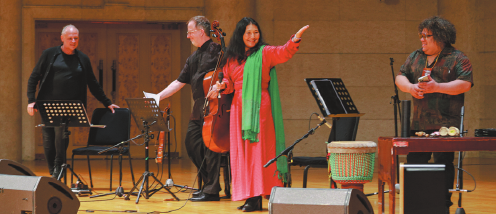Singer captures the voice of the wind
Swaying grasslands provide perfect setting for enthralling sounds of solitude, Chen Nan reports.

Urna Chahar-Tugchi, known by her stage name Urna, has been singing for as long as she can remember. Long before she ever stepped onto a stage or recorded an album, her voice echoed across the grasslands of Ordos in North China's Inner Mongolia autonomous region — unaccompanied, spontaneous, and free.
As a child, she spent countless hours alone on horseback, tending to sheep or cattle. In that vast, open landscape, her only companions were the sky, the wind, and her own voice. She would sing — sometimes traditional Mongolian melodies, but often her own compositions, sounds that seemed to come from deep within her, or perhaps from beyond.
Her mother would ask, "What are you singing?"
Even then, it was clear — these were not inherited songs, but personal expressions, rooted in solitude, born of silence. This deeply instinctive, almost mystical relationship with her voice has stayed with Urna throughout her life.
Through her acclaimed career, which has taken her to more than 90 countries, she has collaborated with musicians from all over the world, creating rich, cross-cultural albums that blend tradition with innovation. But always, beneath the instruments and arrangements, there was something waiting — a quieter, more personal sound.
Now, after many years, that sound has finally emerged as a full work: Duun/Voices, referring to "voices from the universe". This is Urna's most intimate album yet. A collection of purely vocal music, it represents the realization of a vision she has carried since childhood — no instruments, no translations, just voice.
"More and more people are realizing that we should stop, cherish our inner needs, and learn to breathe and sing. Maybe we're too accustomed to the same sounds, the same melodies, but in the vastness of the universe, there are all kinds of sounds. Sing loudly, don't be afraid of singing 'wrong'," Urna says.
"Even if you're just humming at home, it's still wonderful. Singing is like a key that belongs only to you — a key that can unlock your true self. This is something others can't give you."
Urna notes that she didn't deliberately arrange or plan this new album, which is the culmination of ideas she's nurtured for over 20 years.
"What surprised me was that many people have written to me, telling me that my singing helps their babies fall asleep. It's quite magical. So, this album featuring pure voice may contribute to calming babies," she laughs.
The album features 14 songs and pays tribute to Urna's homeland and family. It includes traditional Mongolian folk songs, as well as original pieces written by her.
To support the album, Urna has toured seven Chinese cities this July, including Beijing, Shanghai, Nanjing and Chengdu, alongside her musician friends: Hungarian violinist Zoltan Lantos, Spanish cellist Sergi Boadella, and Colombian percussionist Toby Senior Vega.
"I felt the energy of distant legends and ancient rituals from her music," said one audience member after watching Urna's concert in Beijing on July 3.
"There were many unexpected surprises in her show, and I must say she is a master. The sound of the grassland tells the story of the grassland," said another attendee after watching Urna's concert in Chengdu, Sichuan province, on July 13 — the final stop of her latest tour. "Her pure and ethereal voice awakened my memories."
Born into a family of herders, Urna learned hundreds of traditional Mongolian songs from her grandmother and parents. As she recalls, her grandmother was particularly skilled at singing. When Urna was little, she would accompany her grandmother to the grasslands to herd sheep.
"I still remember her sitting on the grassland with her eyes closed, singing. In front of me was a vast expanse of land, and the swaying grass looked as if it was dancing, almost like watching a movie," Urna recalls.
There were no formal music lessons on the grassland, but Urna could sing anytime, anywhere, and she did — whether riding her horse, herding cattle, or simply being alone.
At 21, Urna left her hometown for the first time and studied the yangqin (a hammered dulcimer) at the Shanghai Conservatory of Music. It was during this time that she began her career as a singer.
While studying basic music theory at the conservatory, she found herself returning to her Mongolian roots. During the 1990s, she frequently traveled back home to collect local folk songs, which deepened her understanding of those traditional melodies.
"Each of us has our own roots. If we develop a solid foundation, there's so much room for growth. Right now, I'm singing, especially with this new album, and I'm expressing music the same way I did when I was a child," she says, adding that she is deeply grateful for her parents and her hometown. Her deep connection to folk traditions, vast landscapes, and the nomadic lifestyle has greatly influenced her sound.
Later, she traveled to Europe and collaborated with musicians from around the world, releasing seven albums, including Crossing, in 1997, where Urna worked with musicians playing instruments like the yangqin, guzheng (a traditional Chinese zither-like instrument), and sheng (one of the oldest Chinese wind instruments, often referred to as a mouth organ or free reed instrument).
In 2001, she released Jamar, an album that saw her singing alongside a diverse range of instruments, from Indian percussion to the morin khuur, or horse-headed fiddle, a traditional string instrument central to Mongolian music. In 2018, she released Ser (Awakening), in collaboration with the Polish band Kroke, featuring accordionist Jerzy Bawol, double bassist Tomasz Lato, and violinist Tomasz Kukurba.
"My music is like the grassland — there's grass, flowers, sheep, and horses. It shouldn't have just one color, nor should it be confined by any dogmatic form," Urna says. "No matter what kind of music it is, I can sing it; this is my true nature."



Today's Top News
- Top DPRK leader visits China-DPRK Friendship Tower
- China proposes global cooperation body on AI
- Scholars propose inclusive human rights framework
- Turning challenges into opportunities
- Nighttime economy savoring more success
- China calls for calm over border clash






























